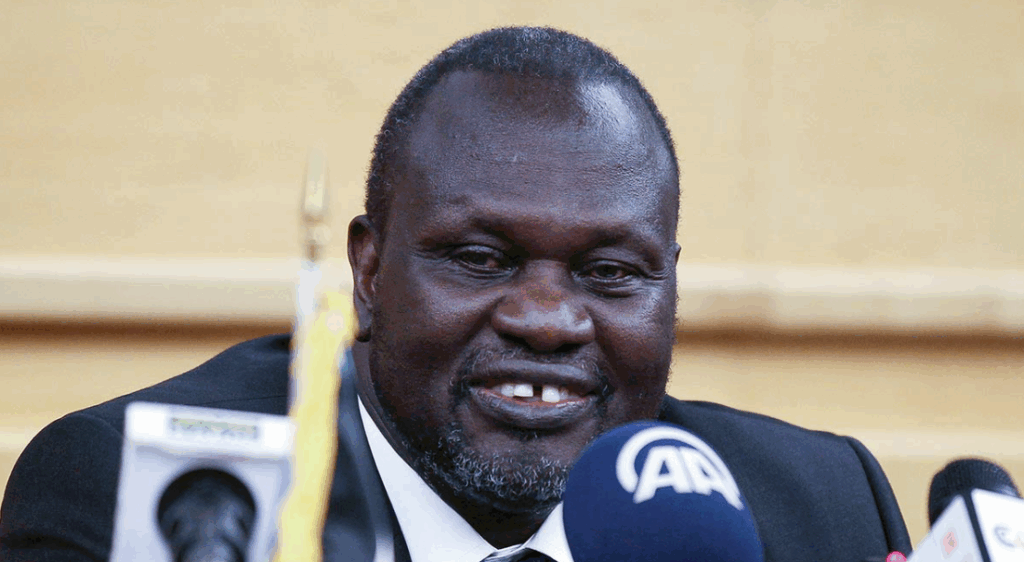The special court established to try South Sudan’s suspended First Vice President Dr. Riek Machar and seven co-accused resumed proceedings Wednesday, holding its eighth session at Freedom Hall in Juba.
During the session, prosecutors submitted four additional documentary exhibits and two physical items for consideration. Despite objections from the defense, the court provisionally admitted the materials.
One of the exhibits included a letter from the National Communications Authority, dated Sept. 5, 2025, concerning the extraction of data from electronic devices allegedly belonging to the accused. It was submitted along with two ministerial orders from the Ministry of Justice and Constitutional Affairs, also dated Sept. 5, authorizing the photographing and approval of the extracted evidence.
The defense argued that the documents were issued after the case had already been referred to the court on Sept. 1, raising concerns about procedural integrity.
Another exhibit was a report from the National Security Service, dated Sept. 3, detailing a radio signal device allegedly linked to Machar. Additional materials included USB flash drives said to contain audio and video recordings related to the Nasir incident, and a notebook allegedly documenting communication logs associated with the radio device.
The defense challenged the legality of the evidence, citing violations of Article 22 of the Constitution, which guarantees the right to privacy, and arguing the items were obtained without a warrant or adherence to search procedures under the Criminal Procedure Act of 2008.
A third exhibit presented by prosecutors was a report dated March 10, 2025, signed by Gen. Santino Deng Akot of the South Sudan People’s Defence Forces. It detailed the evacuation of government troops from Nasir following the overrun of an SSPDF base by armed youth on March 4.
The defense countered that the evacuation, including the recovery of the bodies of the late Gen. David Majur Dak and a U.N. staff member, was coordinated by Machar with the knowledge of President Salva Kiir, the Cabinet, the United Nations Mission in South Sudan and peace agreement guarantors.
The final documentary exhibit was a press statement issued by the U.N. Security Council on March 21, 2025, condemning an attack on U.N. personnel. The defense emphasized that the statement did not mention the accused or link them to the incident under investigation.
Prosecutors also introduced a Samsung mobile phone and a MacBook laptop, which they said belonged to Machar. The defense objected to their admission on constitutional grounds, reiterating that the devices were seized without a warrant and in violation of privacy laws.
The court deferred a ruling on the admissibility of the devices until a forensic expert can analyze the data reportedly extracted from them.
The court granted the defense team one hour to visit the seven detainees currently held at the National Security Service’s Blue House facility. Three of the detainees — Gen. Gabriel Duop Lam, 1st Lt. Mading Yak Riek and Dominic Gatgok Riek — were recently transferred to the Blue House from other detention centers in Giyada.
In a separate decision, the court allowed Gatwech Lam Puoch to leave temporarily to offer condolences to his family following the death of a relative.
Presiding Judge James Alala Deng adjourned proceedings to Monday, Oct. 13. The next session is expected to continue with testimony from forensic experts.
Machar and the seven other accused face charges including treason, crimes against humanity, mass murder, terrorism and destruction of property.
The case relates to attacks in March 2025 on an army base in Nasir County that killed Gen. David Majur Dak and dozens of soldiers. The government has alleged the assaults were carried out by Machar’s Sudan People’s Liberation Movement/Army-in-Opposition and an allied militia known as the White Army.




